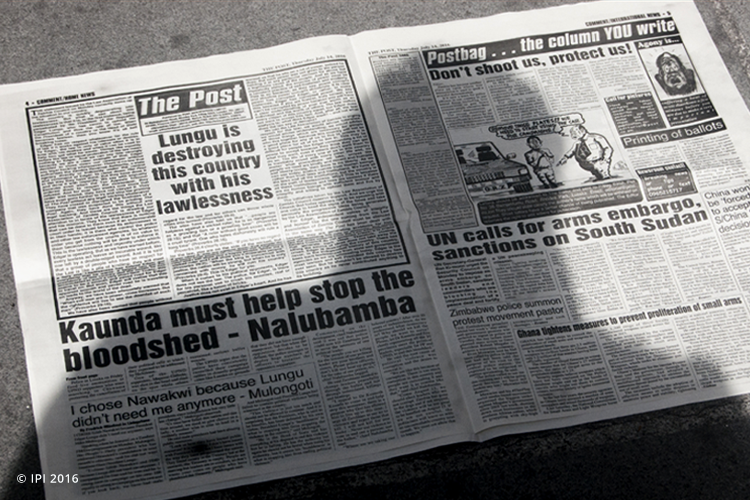The International Press Institute (IPI) today released a report on its joint emergency press freedom mission to Zambia last month with the African Media Initiative (AMI) to examine government pressure on opposition newspaper The Post ahead of Aug. 11 elections.
The report finds that the ongoing seizure of the daily’s offices and printing press in Lusaka by revenue authorities, as well as continuing attempts to hinder its ability to continue publishing, appear to be part of a politically motivated attempt by President Edgar Lungu’s Patriotic Front party to silence a persistent critic in order to hold on to power.
The Zambia Revenue Authority (ZRA) says the seizure is intended to collect 53.9 million kwacha (approximately €4.8 million) the daily owes for allegedly unpaid VAT receipts and employee income tax remittances – an amount The Post disputes.
But the IPI/AMI report finds that “[t]he overwhelming pattern of government conduct… conclusively demonstrates that this case is not about the timely and proper collection of taxes.” Report author Steven M. Ellis, IPI’s director of advocacy and communications, warned that the case “could have an extremely negative impact on democracy in the region, insofar as other leaders might take note and seek to misuse state power to similar ends”.
For weeks, the ZRA has defied an order by Zambia’s Tax Appeals Tribunal to turn the seized premises over to The Post and to allow it to resume printing. The Post continues to publish in secret, but those helping it to do so have faced harassment and intimidation.
IPI and the AMI called on the government to obey the order and end pressure on The Post.
The case is one of a number of troubling developments – including a rise in political violence and pressure on media – that have cast a shadow over Zambia’s reputation as a leader in respect for democracy and human rights in the region.
The IPI/AMI report follows a July 13 to 15 visit to Lusaka in which delegates from the groups met with representatives from government, the leading opposition party, The Post, the judiciary, civil society and the legal community, and foreign diplomatic missions.
Read and Download: “A Shadow over Democracy”
